Purpose: Maternal Mental Health Disorders (MMHD) afflict up to 23% of Canadian women. Though there are available MMHD care pathways within the current perinatal mental health system, our study aimed to clarify these pathways with respect to women’s needs. The objective was to understand the mental health care journey of women and the current perinatal mental healthcare support systems in Toronto to lessen the burden of MMHD. Methods: Semi-structured interviews were conducted over the telephone with women and HCPs. The interview questions pertained to women’s lived experiences with MMHD care pathways, barriers and facilitators to perinatal mental health supports, and healthcare provider experiences offering care to women with MMHD. Data collected from the interviews underwent thematic analysis guided by Donabedian’s structure-process-outcome model for examining healthcare and service quality. In addition to these three categories, context of care was added to the model to account for individual factors affecting MMHD. Results: Data from women (n=13) and HCPs (n=16) was categorized into the four themes and related subthemes using a code book. Structural barriers included lack of resource availability and variety. Barriers to the process were identified as limited continuity of care and lack of preventative strategies for MMHD. Outcome barriers incorporated fear of stigma, ineffective communication, and symptom unawareness. Conclusion: Our findings suggest that there are notable barriers to accessing MMHD care. Comprehending these challenges from the perspective of women and HCPs can alleviate obstacles in MMHD care delivery. Further research in this area is warranted.
Spring Virtual Conference April 17-18th | In-Person Annual Conference in San Antonio, TX Oct 24-26th


Leave a Reply